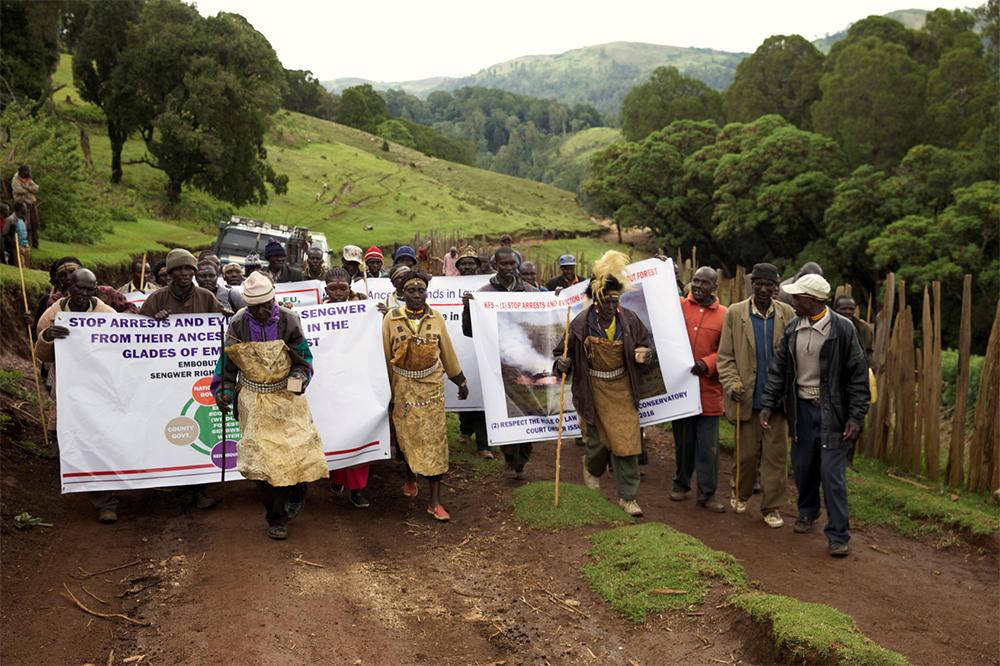Amplifying Indigenous and local community voices to Decolonise Conservation

On 5th March, the School of Geography and the Environment became an international hub for decolonizing conservation, by hosting the panel The Future of Conservation: COP26 and Beyond.
The panel brought together 5 Indigenous and local leaders from Afrika (Tanzania, Kenya) and Abya Yala (México, Brazil) - Francis Shomet Ole Naingisa, Samwel Nangiria, Milka Chepkorir, Nansedalia Ramírez Domínguez and Erick Marky - and with 2 leading academics - Dr Jerome Lewis (Radical Anthropology Group, UCL) and Dr Robert Fletcher (Sociology of Development and Change group, Wageningen University). SoGE's Dr Ariell Ahearn moderated the discussion.
The framing of the event was COP26, deemed by Prof Tim Flannery as 'humanity's last chance to avoid an environmental apocalypse'. The panel was thus a call to action to begin building solidarity ties between Indigenous and local community leaders and academics, in order to bring a united front to COP26.
Over the last few years there has been an increasing level of exposure around the ongoing human rights abuses and land grabs committed in the name of wildlife conservation by numerous Global North NGOs. An estimated 136 million people have been displaced in the process of creating conservation areas, with killings, torture, sexual and physical violence, and intimidation reported in areas managed or supported by WWF, for example.
In this context, the current draft of the U.N.'s Convention on Biological Diversity post-2020 Global Biodiversity framework seeks to protect at least 30% of Earth's land surface by 2030 - however, the draft does not include protections for the rights of over 1.65 billion Indigenous peoples, local communities and Afro-descendants in high biodiversity areas. Given that Indigenous peoples represent 5% of the population yet safeguard 80% of the world's biodiversity, any conservation solution without the leadership of Indigenous and local peoples is doomed to repeat the mistakes of the past. We need a new future of conservation. And we need it now.
This panel was born out of the #DecoloniseConservation campaign from a youth education, action and solidarity campaign which seeks to mobilise the Global North environmental movement against fortress and colonial conservation in solidarity with Indigenous and local communities, and following the science that denounces the failures of fortress conservation at protecting biodiversity.
#DecoloniseConservation, an engagement campaign from XR Youth Solidarity, proposes that conservation efforts responding to the climate crisis must be led by Indigenous and/or local communities, and that the role of Global North conservation organizations must be transformed to ensure a future of conservation based on justice. In partnering with the School of Geography and the Environment, #DecoloniseConservation finds a platform to amplify the necessity to shift to a new conservation paradigm for both people and planet. This partnership is partly facilitated by Colombian student scholar activist Sara Cordovez Lopez (MSc in Nature, Society and Environmental Governance), demonstrating the youth-led nature of this collaboration.
SoGE and XR Youth Solidarity hope to host more events like this, bringing together Indigenous and local leaders, activists and academics to foster international discussion in the run up to COP26, falling under the theme of Nature.
Further information
- Watch the panel: The Future of Conservation: COP26 and Beyond
Amplifying Indigenous and local community voices to Decolonise Conservation
On 5th March, the School of Geography and the Environment became an international hub for decolonizing conservation, by hosting the panel 'The Future of Conservation: COP26 and Beyond'. Born out of #DecoloniseConservation, an engagement campaign from XR Youth Solidarity, the panel was a call to action to begin building solidarity ties between Indigenous and local community leaders and academics, in order to bring a united front to COP26 and seek protections for the rights of over 1.65 billion Indigenous peoples, local communities and Afro-descendants in high biodiversity areas.





